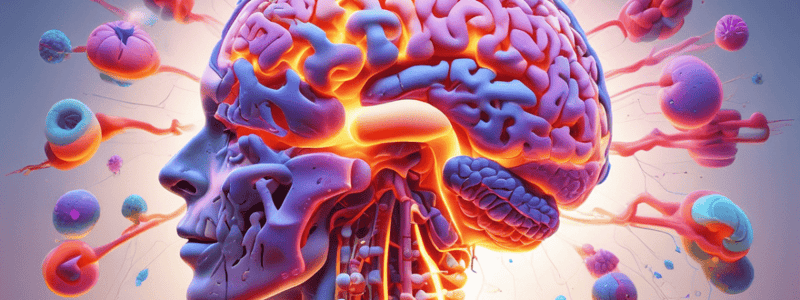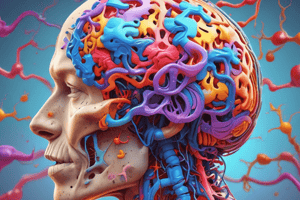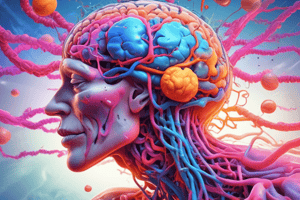Podcast
Questions and Answers
What are some common complications of Guillain-Barre Syndrome (GBS)?
What are some common complications of Guillain-Barre Syndrome (GBS)?
Long term physical weakness, Respiratory failure, Respiration pneumonia, Prolonged ventilation, Sudden unexplained cardiac death
What is the cause of Amyotrophic Lateral Sclerosis (ALS)?
What is the cause of Amyotrophic Lateral Sclerosis (ALS)?
The cause of ALS is not known, with 90% of cases occurring spontaneously and 5 to 10% linked to a specific gene mutation.
What are some common symptoms of ALS?
What are some common symptoms of ALS?
Sialorrhea (excessive drooling), Respiratory difficulty, Parkinson's like symptoms, Cognitive impairment, Inappropriate excessive behavioral responses to emotional events, Muscle spasm
What is delirium?
What is delirium?
What are some causes of delirium?
What are some causes of delirium?
What percentage of inpatients older than 70 years in the US experience delirium?
What percentage of inpatients older than 70 years in the US experience delirium?
For which patients is it common to consult an SLP for speech, language, and swallowing evaluation in cases of delirium?
For which patients is it common to consult an SLP for speech, language, and swallowing evaluation in cases of delirium?
What are some risk factors for delirium?
What are some risk factors for delirium?
What is Guillian Barrie syndrome characterized by?
What is Guillian Barrie syndrome characterized by?
What is the only FDA-approved medication used for ALS?
What is the only FDA-approved medication used for ALS?
How are anticholinergic medications used in ALS management?
How are anticholinergic medications used in ALS management?
What non-oral means of feeding may ALS patients need to use?
What non-oral means of feeding may ALS patients need to use?
What are the hallmark symptoms of Parkinson's disease (PD)?
What are the hallmark symptoms of Parkinson's disease (PD)?
What type of drugs are used in PD management to manage early and advanced symptoms?
What type of drugs are used in PD management to manage early and advanced symptoms?
What is the aim of neuroprotective drugs in PD management?
What is the aim of neuroprotective drugs in PD management?
What is the purpose of LSVT-loud treatment?
What is the purpose of LSVT-loud treatment?
How does Deep Brain Stimulation (DBS) help patients?
How does Deep Brain Stimulation (DBS) help patients?
What is a potential communication difficulty caused by anticholinergic drugs?
What is a potential communication difficulty caused by anticholinergic drugs?
What is the main focus of managing communication difficulties resulting from drug adverse effects?
What is the main focus of managing communication difficulties resulting from drug adverse effects?
How can communication difficulties caused by drug adverse effects be addressed?
How can communication difficulties caused by drug adverse effects be addressed?
What type of dysarthria is associated with antiepileptic drugs?
What type of dysarthria is associated with antiepileptic drugs?
Why do older adults become more vulnerable to adverse drug reactions?
Why do older adults become more vulnerable to adverse drug reactions?
What are some common conditions that are sometimes mistaken as a normal part of aging?
What are some common conditions that are sometimes mistaken as a normal part of aging?
How do older adults' experience of depression differ from young adults?
How do older adults' experience of depression differ from young adults?
What are some age-related changes that can affect communication in older adults?
What are some age-related changes that can affect communication in older adults?
What percentage of hospital admissions in the US are due to adverse drug events?
What percentage of hospital admissions in the US are due to adverse drug events?
Why might older adults not report symptoms of a disease?
Why might older adults not report symptoms of a disease?
Flashcards are hidden until you start studying




